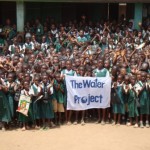The report below from our partner in the field gives some great information on the construction of new latrines at Waiga Primary School in Uganda. This school already has a source of safe, clean water. The aim of this project is to provide latrines for the school's use and training in proper sanitation and hygiene.
Introduction.
Located in the most populated sub-county of Masindi District with an enrollment of 822 pupils of which 452 are boys and 370 girls, Waiga Primary School, a church of Uganda founded school, is one of the many schools in Uganda faced with acute latrine shortages. At the moment both pupils and teachers share the same dilapidated latrines which poses a threat to the girl child hence one of the leading factors to school drop out. According to the ministry of Education in Uganda, 60% of the pupils enrolled in primary one drop out before completing primary seven in Uganda.
According to Mr. Eddie Rufunda the headmaster of this school, the school management has endeavored to maintain hygiene at this school by electing a school health club and he has also appointed a teacher in-charge of sanitation but the challenges in this school are beyond the school management to handle. These include limited resources and irregular remittances of Universal Primary Education (UPE) capitation grants from the ministry of Education. Mr. Kanaginagi Ateenyi, the district vice chairman and also the District Councillor of Pakanyi sub-county where Waiga primary is located intimated to us that the District has very little funds to finance the needs of the many primary schools in Masindi district.
Sanitation facilities prevent the transmission of diseases as it prevents human faecal contamination of water and soil. The lack of proper sanitation facilities are the cause for a significant proportion of the world’s infectious disease burden. According to the WHO, diseases due to poor water supply, sanitation, and personal and domestic hygiene cause 4.0% of all deaths and 5.7% of all disability or ill health in the world. Moreover, waterborne illnesses predominantly affect the poor and the young. When basic water, sanitation, and hygiene interventions are applied, waterborne illnesses can be effectively reduced (www.who.int).
The Water Trust is going to contribute to the improvement of sanitation by constructing a five stance lined latrine at this school with fully fledged girls wing to cater for their special needs. This lined latrine, designed to last more than thirty years shall periodically emptied not like the old one at the school which can not as it is an ordinary pit latrine. At the end of the project, the pupil-latrine stance ratio will be reduced and the girl child will have an enabling environment to access sanitation facilities. As we construct this modern facility, our social team will train this school in sanitation related issues and will also strengthen the sanitation committees through continuous education for purpose of sustainability.
December 9, 2013
Construction works have been commenced and the contractor is on site working. A contract between TWT and the contractor has been signed and all works will take about four weeks.
December 16, 2013
Masonry work progressing well, now walling.
December 18, 2013
Both roofing and plastering concurrently on going . This site will then be left for at least one week to set before paint work is done.
January 6, 2014
Painting works have been completed and plans for handover of this sanitation facility to the school management committee will be organized when the new school year reopens on February 3, 2014.
 WAsH for Schools
WAsH for Schools Rehabilitation Project
Rehabilitation Project












